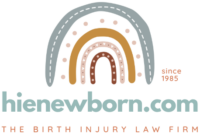Fill out the form below to share details about your situation
What is cerebral palsy?
Cerebral palsy is a brain injury that damages the nervous system and affects a child’s ability to control their movements and posture.
This damage can occur due to a lack of oxygen to the brain, infection, or physical trauma during delivery. The severity of cerebral palsy varies greatly, with some children experiencing mild symptoms while others are completely immobile.
What are the symptoms of cerebral palsy?
The symptoms of cerebral palsy depend on the type of cerebral palsy and the severity of the condition.
There are four types of cerebral palsy:
What are the symptoms of cerebral palsy?
The symptoms of cerebral palsy depend on the type of cerebral palsy and the severity of the condition.
There are four types of cerebral palsy:
Spastic
Dyskinetic
Ataxic
Mixed
We’re committed to protecting your child’s future.
If your child suffered hypoxic ischemic encephalopathy during the birth process, contact our birth trauma lawyers for help.
The Yost Legal Group’s cerebral palsy lawyers have the experience and skills you need. We’ll work with experts in obstetrics before filing your birth injury lawsuit.
We know how to fight against multi-million dollar healthcare organizations and insurers to hold medical professionals responsible for their negligence.
Birth Injury FAQs
How is cerebral palsy diagnosed?


Cerebral palsy is typically diagnosed during infancy, although it can be diagnosed later in childhood. Diagnosis involves a physical examination, medical history, and neurological testing. Doctors may also use imaging tests such as an MRI or CT scan to look for signs of brain damage.
What treatments are available for cerebral palsy?


Cerebral palsy has no cure. However, treatments can help to manage symptoms and improve a child’s quality of life. Treatment may include therapies such as physical therapy, speech therapy, and occupational therapy to improve mobility and develop skills.
Medications may also manage symptoms such as muscle stiffness and spasms. In some cases, surgery may be recommended to improve mobility.
How can parents support their child with cerebral palsy?


Parents of children with cerebral palsy may feel overwhelmed and unsure how to support their child best. Help a child with cerebral palsy by:
- Seeking early intervention services
- Staying informed about their condition
- Advocating for their needs
Parents can also help their children by providing a supportive and nurturing environment. Working with healthcare professionals and therapists to develop a treatment plan and encourage independence and self-esteem is imperative.
The United Cerebral Palsy organization provides many support services and resources for families and children with CP. The National Institutes of Health also provide knowledge and information on CP.



